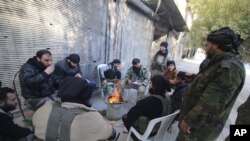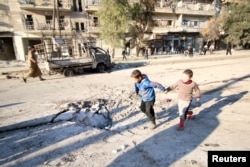Senior members of the rebel coalition arrayed against Syrian President Bashar al-Assad were either deeply skeptical or outright scornful of Russia's attempt to promote a cease-fire plan — because, they say it might only prolong and expand civilians' suffering.
Mohammed Adeeb, a senior figure in the 10,000-strong Shamiya Front, an alliance of secular and moderate armed factions, said his associates are dismissing the cease-fire offer as "a feint."
Adeeb, head of the Shamiya Front's political department, told VOA: “We are going to refuse this cease-fire because it is just a trick which the regime will use to prepare for other military operations.”
Nader Othman, deputy prime minister in the opposition's Syrian Interim Government, said any cease-fire that alleviates civilians' suffering would be welcome. However, he adds, there is also deep skepticism about the motives behind the Russians' proposal in Munich.
“We have supported negotiations and hopefully negotiations usually lead to a cease-fire," Othman told VOA. "With the current Russian campaign of slaughter, of course, we welcome a cease-fire. But we welcome a cease-fire for the sake of the civilians. The attacks are harming civilians more than fighters.”
Honesty of Kremlin's offer 'in doubt'
Othman said members of the opposition have doubts about the honesty of the Kremlin's offer.
“What do the Russians want in return?" he asked. "We will have to see. It seems that they want a cease-fire when the regime is in better shape or governing more strategic areas."
Answering his own rhetorical question, Othman said: "Have they got enough [territory]? We will have to see. But they are saying the cease-fire would start on March 1, and many lives could be lost by then.”





